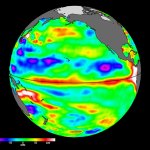Researchers warn the shift can have dire consequences for animals like penguins who breed and rear their young on the sea ice, while also hastening global warming by reducing how much sunlight is reflected by white ice back into space.
Antarctic sea ice extent peaked this year on Sept. 10, when it covered 16.96 million square kilometres, the lowest winter maximum since satellite records began in 1979, the NSIDC said. That’s about one million square kilometres less ice than the previous winter record set in 1986.
“It’s not just a record-breaking year, it’s an extreme record-breaking year,” said NSIDC senior scientist Walt Meier.
NSIDC said that the figures were preliminary with a full analysis to be released next month.
Sea ice in the southern hemisphere generally peaks around September near the end of winter and later melts to its lowest point in February or March as summer draws to a close.
The summer Antarctic sea ice extent also hit a record low in February, breaking the previous mark set in 2022.
The Arctic has been hit hard by climate change over the past decade, with sea ice rapidly deteriorating as the northern region warms four times faster than the global average.
While climate change is contributing to melting glaciers in Antarctica, it has been less certain how warming temperatures are affecting sea ice near the southern pole. Sea ice extent there grew between 2007 and 2016.
The shift in recent years toward record-low conditions has scientists concerned climate change may finally be presenting itself in Antarctic sea ice.
While Meier cautioned it was too soon to say, an academic article published earlier this month in the journal Communications Earth and Environment pointed to climate change as a potential factor.
The study found that warming ocean temperatures, driven mainly by human-caused greenhouse gas emissions, were contributing to the lower sea ice levels seen since 2016.
“The key message here is that to protect these frozen parts of the world that are really important for a whole number of reasons,” said Ariaan Purich, a sea ice researcher at Australia’s Monash University who co-authored the study, “we really need to reduce our greenhouse gas emissions.”
(Reporting by Jake Spring; Editing by Bill Berkrot)






















 Become an Insider
Become an Insider
Wait for the cacophony of protests from the climate change deniers!